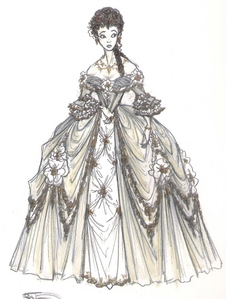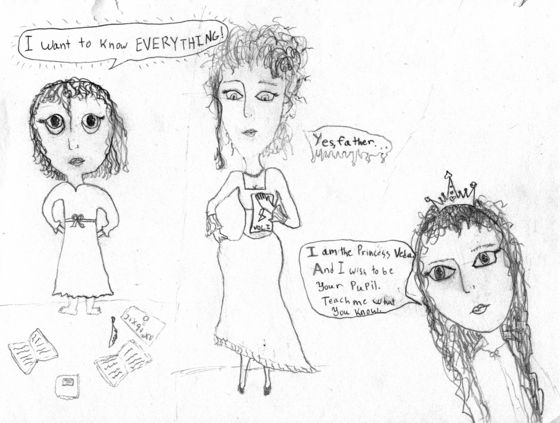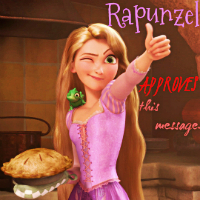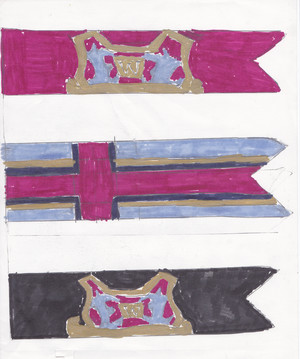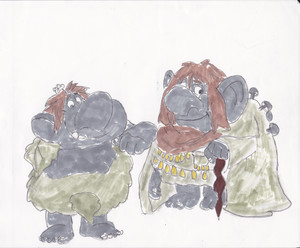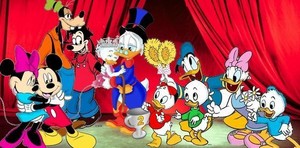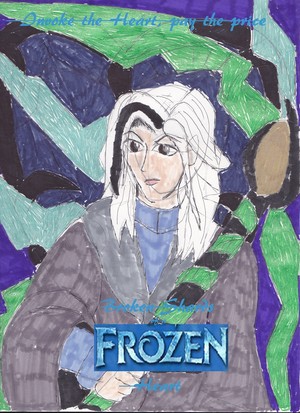So, here is my story, The Wise Princess! It isn't very good, so don't get your hopes up. I split it into two parts because the first part was already super long, like I hope you can get through. Anyway, try to enjoy!
The film begins with a reclusive wizard, who is, among other things, the narrator of this tale. From his underground cave that he has made his home in and filled with many of his magic-making implements and books, he beckons us to his crystal ball. He may sing a short introduction song here, as well. Anyway, we then see a closer view of the crystal ball. Images begin to flash in the crystal ball, and he begins to tell a story.
The narrator shows us the royal family, the queen, the king and the newest addition to the family, the newborn Princess Veda. The happy couple oohs and aahs over their new daughter for a while, until the narrator gets tired of all the lovey dovey-ness and we flash forward in time.
Now we see the queen, and an older Veda. The princess now has long, curly dark brown hair and wide, sea-green eyes. Her face seems to have a nearly constant rambunctious smile. The narrator announces that the princess is six years old, and his last remark is: “I think a little… tragedy is about to strike, so if you’re of faint heart you might wanna leave the room.” With that, his narration stops for now, and we hear the queen talking to her daughter.
“Veda,” her mother says, stroking her daughter’s hair. “The nursemaids tell me you haven’t been the best child recently.”
Veda looks up, her eyes wide with feigned innocence. “Oh, whatever could I have done wrong?”
Her mother smiles at her precocious little daughter. “One nursemaid used the word ‘over-curious’, another said you were ‘impertinent’. Are you really that curious?”
“I suppose I am!” Veda says with a giggle, turning the page of her book. “I just want to know everything!”
Her mother, frowning slightly, kneels down before her daughter. “Now, Veda,” her mother says, as she has been worrying that her child was too engrossed in knowledge, “you must remember: happiness comes first. One could know all there is to know in this world and never have a day of happiness, and one could live a joy-filled life without knowing all there is to know. Do you understand, dear child?”
We then see Veda nod and tell her mother that she thinks she understands, and we transition back to the wizard with the crystal ball. The narrator then says that Veda tried to take her mother’s words to heart, but still couldn’t quite understand. We then see in the crystal ball flashes of the young Veda over the course of several months, being general curious and rambunctious, and flashes of her mother and her together being all lovey-dovey. There might be a song here sung by Veda and her mother about Veda’s curiosity and thirst for knowledge.
After the song, the narrator continues to narrate. “Then,” he says, “the queen fell suspiciously ill. Her condition rapidly worsened, and she showed no signs of getting better.”
Young Veda sat at her mother’s side as she lay dying. The queen had exhibited many strange symptoms after falling ill, but this last one, this partial paralysis and rapid loss of ability to breathe seems like it will finish the queen off. The seven year old is crying by her mothers side as the queen wraps her shaking and sweaty arms around her daugher. “V-Veda,” she says in a hoarse, faint voice, and her daughter stopped crying and looked up at her mother. “Please, do not forget of happiness when… when I am gone. The purpose of our lives is to be happy, and you are not to lose that…” No one ever knew if the queen had more to say to the princess, because it was then that her life ended.
The narrator continues to say that it was impossible to say whether it was the king or the princess who was more saddened by the loss of the queen, but suffice it to say that they were both inconsolable. Little Veda especially, as she had never felt that kind of grief before, and it was then that she could have used her father’s love and support more than ever. However, the king could barely handle the loss of his wife, and the sight of his daughter, who looked quite similar to the deceased queen, was too painful a reminder for the king to bear.
So Veda was sent to a lonely wing of the palace, left to grieve alone. For several months after her mother’s death, not even her beloved books could comfort her. But eventually the sharp pain of grief ended, and the young girl requested her tutors to continue teaching her. In fact, most of her time was spent learning and reading, trying to forget the sadness of the death of her mother and the hurt of being abandoned by the only family she had left.
So for ten interminable years Veda grew and learned, her head becoming more full of knowledge as her heart became more full of loneliness, and on her seventeenth birthday, and almost as lovely as her mother with a noble face and sharp eyes, her father summoned her, and said that he wished to see her again. He wanted things to be what they were, and although Veda faked a smile and said that she accepted him back into her heart with good grace, it was never really true. She could never truly forgive him for turning his back on his little daughter in her time of need.
As Veda was seventeen and of marrying age, her father began summoning suitors for her to marry. By now the princess was quite brilliant and seemed to have no interest in anything but learning, and she was as pretty as her departed mother but nowhere near as happy. She disdained her suitors, as she had disdained everything nonacademic since the death of her mother. In a twist on the usually ‘greedy unwanted suitors’ trope, these suitors are all nice enough boys for the most part. But Veda went so far as to purposefully mess up her hair, wear tattered clothing and rub grease and grime on herself to show her disdain for the people she thought of as not as less intelligent.
There might be a song here sung by the servants, suitors, the king and Veda, about her disdain for pretty much everything, and after that song one of her tutors approach Veda, and say that he has nothing left he can teach her. She’d already learned all she could learn in the palace, and for a few weeks Veda is even more despondent than usual because of her lack of purpose. And Veda needs her all-consuming purpose, for without it she is confronted with her grief that she has always preferred to ignore.
But after a few weeks of lounging around miserably, the seventeen year old princess overhears two of the servants talking about a rumor of a wizard named Raghnall who knew more than any in all the lands. And with that Veda finally regains a purpose, and she fervently searches for more information about the learned and mystical man.
Finally, she discovers where he lives, and in the dead of night she sets out for his cavern to learn from him. She enters the cave, and when she steps into the room we see that the wizard is, as you may have guessed, the narrator of the story. He smiles as if he’d been expecting her when she strides into the room. The teenager then announces herself as the princess, and demands that he teaches her everything that he knows, offering a satchel of gold as payment.
Raghnall refuses her money and her demand, saying that he no longer is taking on students due to dissatisfied customers. Veda asks why his students are dissatisfied, and he replies that they always “whine about the knowledge making them ‘unhappy’”. He tells Veda: “So, you should probably go now. You don’t want to be as unhappy and unsatisfied as they are, now do you?”
But Veda merely replies: “That does not faze me. I am already unhappy.” She sighs wearily and repeats her request for him to teach her.
The old wizard, apparently realizing her steadfastness, agrees to teach her, but says he has no need for the gold. She politely thanks Raghnall for agreeing to teach her, and the teenager leaves to return to her palace as the sun begins to rise.
The wizard begins to narrate the story again, and he says that for the next three years he trained the bright but gloomy Veda in all the sciences he knew, alchemical and otherwise. Their lessons took place in the dead of night, and no one knew that Veda was training with Raghnall, but all of the servants began to remark on how curiously clever Veda was becoming.
Raghnall continues to say that when Veda was twenty years old, she had learned all he could teach. So when she came that night for her next lesson, it was not really a lesson so much as it was a graduation. Veda was upset that she once again had no purpose. She now knew so much, but she was so unhappy it didn’t really matter. At twenty years old, she was even more lonely, and had stopped her childish practice of rubbing grime on herself for her suitors, because the suitors had given up months ago.
Veda began asking people about why they all seemed so happy, in song. None of them really helped her. She asked the servants, but they just said they were happy because they had hope, she tried to ask the corpses in the graveyard, but they didn’t answer her. She also tried to ask some animals, as with her knowledge she was very good at interpreting what the animals meant in their various languages. None of the animals had any good advice for her either.
Veda begins to despair, so she goes to the wizard for help again. She begs him to teach her how to be happy, but he once again tells her that he doesn’t know. He does, however, have a suggestion for finding happiness.
“You must go on a journey,” Raghnall says sagely. “You must travel beyond the lands and peoples you are accustomed to and find those who know true happiness and are wiser than you and I by that accomplishment.”
Veda readily agrees, desperate to find happiness but unsure where it could be, and one night she sets out in a small but sturdy boat she sets out without telling her father or anyone else. She lived the entirety of her life lacking in joy and filling her heart with cold knowledge, and she now blindly seeks love’s warmth and happiness’ light.
So, I hope you enjoyed, although I doubt you did. I'm not a very good writer. Part two of the story should be up in the next few days. Hope you managed to read it all, or something.
The film begins with a reclusive wizard, who is, among other things, the narrator of this tale. From his underground cave that he has made his home in and filled with many of his magic-making implements and books, he beckons us to his crystal ball. He may sing a short introduction song here, as well. Anyway, we then see a closer view of the crystal ball. Images begin to flash in the crystal ball, and he begins to tell a story.
The narrator shows us the royal family, the queen, the king and the newest addition to the family, the newborn Princess Veda. The happy couple oohs and aahs over their new daughter for a while, until the narrator gets tired of all the lovey dovey-ness and we flash forward in time.
Now we see the queen, and an older Veda. The princess now has long, curly dark brown hair and wide, sea-green eyes. Her face seems to have a nearly constant rambunctious smile. The narrator announces that the princess is six years old, and his last remark is: “I think a little… tragedy is about to strike, so if you’re of faint heart you might wanna leave the room.” With that, his narration stops for now, and we hear the queen talking to her daughter.
“Veda,” her mother says, stroking her daughter’s hair. “The nursemaids tell me you haven’t been the best child recently.”
Veda looks up, her eyes wide with feigned innocence. “Oh, whatever could I have done wrong?”
Her mother smiles at her precocious little daughter. “One nursemaid used the word ‘over-curious’, another said you were ‘impertinent’. Are you really that curious?”
“I suppose I am!” Veda says with a giggle, turning the page of her book. “I just want to know everything!”
Her mother, frowning slightly, kneels down before her daughter. “Now, Veda,” her mother says, as she has been worrying that her child was too engrossed in knowledge, “you must remember: happiness comes first. One could know all there is to know in this world and never have a day of happiness, and one could live a joy-filled life without knowing all there is to know. Do you understand, dear child?”
We then see Veda nod and tell her mother that she thinks she understands, and we transition back to the wizard with the crystal ball. The narrator then says that Veda tried to take her mother’s words to heart, but still couldn’t quite understand. We then see in the crystal ball flashes of the young Veda over the course of several months, being general curious and rambunctious, and flashes of her mother and her together being all lovey-dovey. There might be a song here sung by Veda and her mother about Veda’s curiosity and thirst for knowledge.
After the song, the narrator continues to narrate. “Then,” he says, “the queen fell suspiciously ill. Her condition rapidly worsened, and she showed no signs of getting better.”
Young Veda sat at her mother’s side as she lay dying. The queen had exhibited many strange symptoms after falling ill, but this last one, this partial paralysis and rapid loss of ability to breathe seems like it will finish the queen off. The seven year old is crying by her mothers side as the queen wraps her shaking and sweaty arms around her daugher. “V-Veda,” she says in a hoarse, faint voice, and her daughter stopped crying and looked up at her mother. “Please, do not forget of happiness when… when I am gone. The purpose of our lives is to be happy, and you are not to lose that…” No one ever knew if the queen had more to say to the princess, because it was then that her life ended.
The narrator continues to say that it was impossible to say whether it was the king or the princess who was more saddened by the loss of the queen, but suffice it to say that they were both inconsolable. Little Veda especially, as she had never felt that kind of grief before, and it was then that she could have used her father’s love and support more than ever. However, the king could barely handle the loss of his wife, and the sight of his daughter, who looked quite similar to the deceased queen, was too painful a reminder for the king to bear.
So Veda was sent to a lonely wing of the palace, left to grieve alone. For several months after her mother’s death, not even her beloved books could comfort her. But eventually the sharp pain of grief ended, and the young girl requested her tutors to continue teaching her. In fact, most of her time was spent learning and reading, trying to forget the sadness of the death of her mother and the hurt of being abandoned by the only family she had left.
So for ten interminable years Veda grew and learned, her head becoming more full of knowledge as her heart became more full of loneliness, and on her seventeenth birthday, and almost as lovely as her mother with a noble face and sharp eyes, her father summoned her, and said that he wished to see her again. He wanted things to be what they were, and although Veda faked a smile and said that she accepted him back into her heart with good grace, it was never really true. She could never truly forgive him for turning his back on his little daughter in her time of need.
As Veda was seventeen and of marrying age, her father began summoning suitors for her to marry. By now the princess was quite brilliant and seemed to have no interest in anything but learning, and she was as pretty as her departed mother but nowhere near as happy. She disdained her suitors, as she had disdained everything nonacademic since the death of her mother. In a twist on the usually ‘greedy unwanted suitors’ trope, these suitors are all nice enough boys for the most part. But Veda went so far as to purposefully mess up her hair, wear tattered clothing and rub grease and grime on herself to show her disdain for the people she thought of as not as less intelligent.
There might be a song here sung by the servants, suitors, the king and Veda, about her disdain for pretty much everything, and after that song one of her tutors approach Veda, and say that he has nothing left he can teach her. She’d already learned all she could learn in the palace, and for a few weeks Veda is even more despondent than usual because of her lack of purpose. And Veda needs her all-consuming purpose, for without it she is confronted with her grief that she has always preferred to ignore.
But after a few weeks of lounging around miserably, the seventeen year old princess overhears two of the servants talking about a rumor of a wizard named Raghnall who knew more than any in all the lands. And with that Veda finally regains a purpose, and she fervently searches for more information about the learned and mystical man.
Finally, she discovers where he lives, and in the dead of night she sets out for his cavern to learn from him. She enters the cave, and when she steps into the room we see that the wizard is, as you may have guessed, the narrator of the story. He smiles as if he’d been expecting her when she strides into the room. The teenager then announces herself as the princess, and demands that he teaches her everything that he knows, offering a satchel of gold as payment.
Raghnall refuses her money and her demand, saying that he no longer is taking on students due to dissatisfied customers. Veda asks why his students are dissatisfied, and he replies that they always “whine about the knowledge making them ‘unhappy’”. He tells Veda: “So, you should probably go now. You don’t want to be as unhappy and unsatisfied as they are, now do you?”
But Veda merely replies: “That does not faze me. I am already unhappy.” She sighs wearily and repeats her request for him to teach her.
The old wizard, apparently realizing her steadfastness, agrees to teach her, but says he has no need for the gold. She politely thanks Raghnall for agreeing to teach her, and the teenager leaves to return to her palace as the sun begins to rise.
The wizard begins to narrate the story again, and he says that for the next three years he trained the bright but gloomy Veda in all the sciences he knew, alchemical and otherwise. Their lessons took place in the dead of night, and no one knew that Veda was training with Raghnall, but all of the servants began to remark on how curiously clever Veda was becoming.
Raghnall continues to say that when Veda was twenty years old, she had learned all he could teach. So when she came that night for her next lesson, it was not really a lesson so much as it was a graduation. Veda was upset that she once again had no purpose. She now knew so much, but she was so unhappy it didn’t really matter. At twenty years old, she was even more lonely, and had stopped her childish practice of rubbing grime on herself for her suitors, because the suitors had given up months ago.
Veda began asking people about why they all seemed so happy, in song. None of them really helped her. She asked the servants, but they just said they were happy because they had hope, she tried to ask the corpses in the graveyard, but they didn’t answer her. She also tried to ask some animals, as with her knowledge she was very good at interpreting what the animals meant in their various languages. None of the animals had any good advice for her either.
Veda begins to despair, so she goes to the wizard for help again. She begs him to teach her how to be happy, but he once again tells her that he doesn’t know. He does, however, have a suggestion for finding happiness.
“You must go on a journey,” Raghnall says sagely. “You must travel beyond the lands and peoples you are accustomed to and find those who know true happiness and are wiser than you and I by that accomplishment.”
Veda readily agrees, desperate to find happiness but unsure where it could be, and one night she sets out in a small but sturdy boat she sets out without telling her father or anyone else. She lived the entirety of her life lacking in joy and filling her heart with cold knowledge, and she now blindly seeks love’s warmth and happiness’ light.
So, I hope you enjoyed, although I doubt you did. I'm not a very good writer. Part two of the story should be up in the next few days. Hope you managed to read it all, or something.
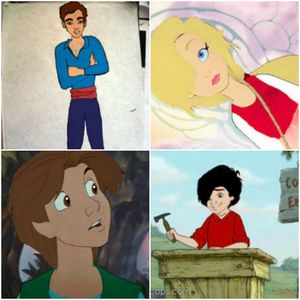
The concept art of the stars

The Blue Ancora


